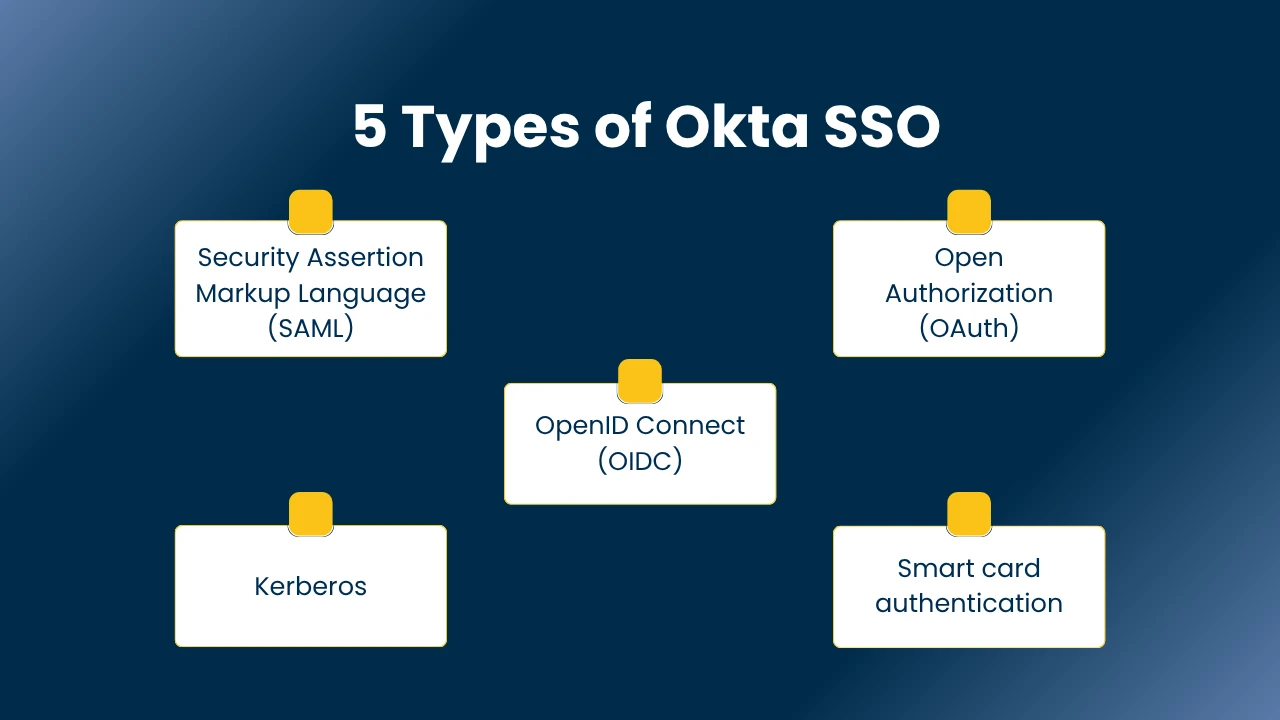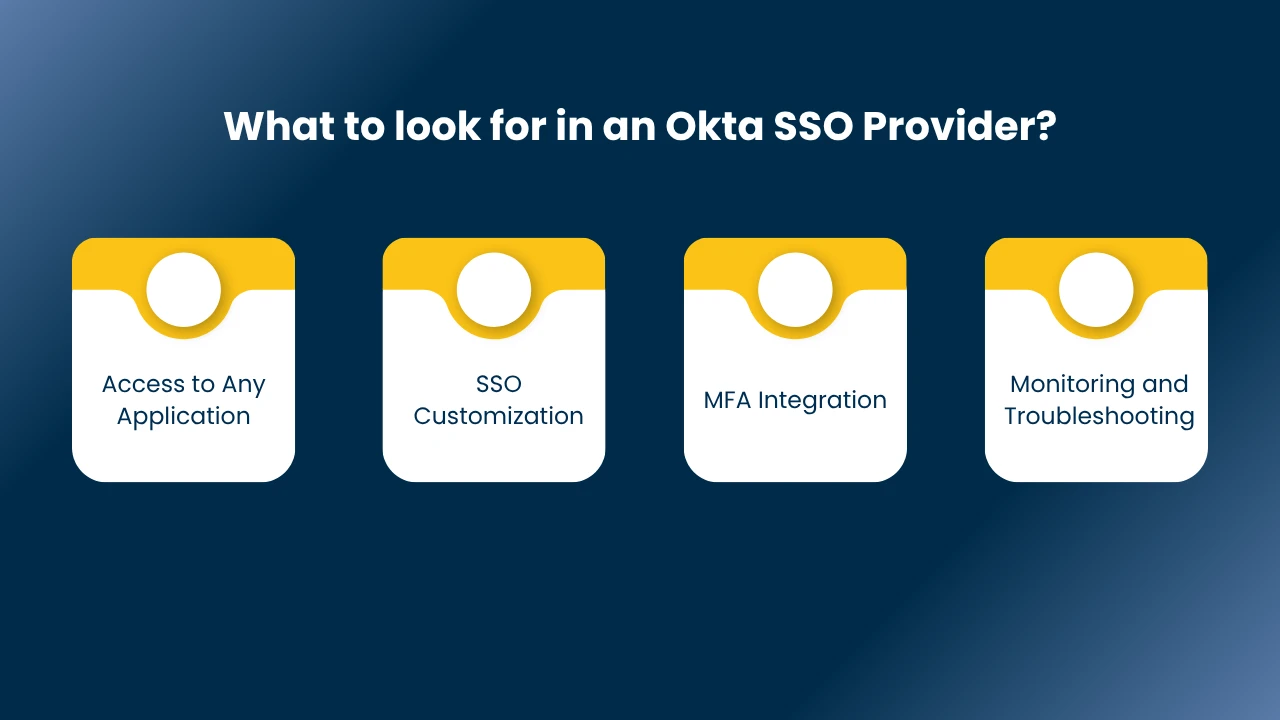Okta SSO: Everything You Need to Know About Okta SSO in 2025

Do you juggle many passwords for work apps, social media, and online services? It is a common problem in our digital lives. Remembering them all is tough, and it can also put your online security at risk. Imagine if you could log into everything with just one username and password. This is exactly what Single Sign-On (SSO) offers. In this blog, we will dive into Okta SSO, a leading solution that simplifies access and boosts security for businesses in India. We will explain how it works, its many benefits, and why it’s a smart choice for your digital needs.
How Does Okta SSO Work?
Okta SSO works on a simple idea called ‘federated identity’. This means different online systems share your identity information in a trusted way. Once one system trusts you, you automatically get access to other systems that have a special link with it. This is the main idea behind modern SSO solutions, which use special rules like OpenID Connect and SAML 2.0. This makes integration with Okta smooth and easy for users.
How Do Okta SSO Tokens Work?
SSO works like digital keys that prove a user’s identity. When a user signs in to a service with their SSO login, an authentication token is created and stored either in their browser or in the SSO solution’s central authentication service (CAS) server. Any app or website the user later accesses will check with the SSO service. The SSO service then sends the user’s token to confirm their identity and give them access without needing to log in again. This process ensures a smooth and secure experience across different platforms. This token-based system is key to effective Okta SSO integration.
5 Types of Okta SSO
There are different ways and rules (protocols and standards) that SSO uses. Here are some important ones:

1. Security Assertion Markup Language (SAML)
SAML is an open standard. It turns text into a language computers understand, allowing them to share identity information. It is a main standard for SSO and helps app providers make sure their login requests are correct. SAML 2.0 is especially good for web applications, letting information travel through a web browser.
2. Open Authorization (OAuth)
OAuth is an open standard that helps transfer identity information between apps and also turns it into machine code. This allows users to give an app permission to use their data from another app without having to log in manually again.
3. OpenID Connect (OIDC)
OIDC works on top of OAuth 2.0. It adds more user information and helps the SSO process. It lets you use one login session across many applications. For example, OIDC allows you to log in to a service using your Facebook or Google account instead of typing new login details.
4. Kerberos
Kerberos is a system that checks both the user’s and the server’s identity on unsafe network connections. It uses a special service that gives out “tickets” to prove who users and software apps (like email or wiki tools) are.
5. Smart card authentication
Beyond regular SSO, you can also use hardware like physical smart card devices. Users plug these into their computers. Software on the computer uses special codes on the smart card to log in each user. While smart cards are very secure and need a PIN, you have to carry them physically, which means they can get lost. They can also be costly to use.
Also Read: Introduction to Okta Workflows for Identity Automation
On Premises vs. Cloud Based Okta SSO
Choosing an SSO solution means thinking about your company’s IT plan, security needs, and how you operate. This includes deciding between on-premises or cloud-based options. We have mention a comparison table of On-premises vs. cloud-based SSO for your better understanding.
| Feature | On-premises SSO | Cloud-based SSO |
|---|---|---|
| Location | Installed and maintained on your company’s own servers. | Hosted and managed by a service provider over the internet. |
| Control | You have full control over the SSO environment. | The provider manages the infrastructure; you have less direct control. |
| Upfront Costs | Higher, due to hardware and software purchases. | Lower, as you pay for service usage, not infrastructure. |
| Maintenance | Requires significant internal IT resources. | Managed by the provider, reducing your IT workload. |
| Scalability | Can be harder and more costly to scale up or down. | More flexible; easily adjusts based on your needs. |
| Security | You are responsible for all security measures. | Relies on the provider’s security and compliance. |
| Example | Setting up your own SSO server within your office. | Using a service like Okta SSO for your login needs. |
For many businesses, especially those looking for easy setup and less IT burden, a cloud-based solution like Okta SSO offers a lot of advantages.
Top 5 Benefits of Okta SSO
Companies that use Okta SSO get many benefits. They avoid risks from using the same passwords everywhere and give users a smooth experience. Key benefits of SSO include:
1. Decreased attack surface
Okta SSO helps stop “password fatigue” and bad password habits. This immediately makes your business less open to online attacks like phishing. It lets users focus on remembering one strong, unique password. It also cuts down on the time and cost spent on resetting forgotten passwords.
2. Seamless and secure user access
Okta SSO gives you real-time information about who accessed applications, when, and from where. This helps businesses protect their systems. SSO solutions also deal with security risks, like an employee losing their work device. IT teams can quickly block access to accounts and important data from that device. This is a key advantage of Okta sso integration.
3. Simplified user access auditing
In a changing business world, it can be hard to make sure the right people have the right access to sensitive data and tools. SSO solutions can set up a user’s access rights based on their role, department, and experience. This always gives you clear information and a good view of who can access what.
4. Empowered and productive users
Users today want quick and easy access to the apps they need to do their work. Handling these requests manually takes a lot of effort and can make users frustrated. SSO authentication removes the need for manual checks, giving instant access to thousands of apps with just one click. This boosts productivity and makes sso integration with Okta a valuable asset.
5. Future-proofing
Okta SSO is the first step to making your company and its users more secure for the future. Also, SSO allows companies to use other good security practices. This includes setting up multi-factor authentication (MFA) and using tools for identity checks, risk ratings, and managing permissions to meet rules and stop fraud.
What are the Challenges of Okta SSO?
While Okta SSO is user-friendly and convenient, it can pose security risks if you do not manage or set it up properly. Here are some challenges:
1. User access risks
If an attacker gets a user’s SSO login details, they also get access to every app that user can use. So, it is very important to use more security checks than just passwords.
2. Potential vulnerabilities
Some weaknesses have been found in SAML and OAuth that allowed attackers to get into web and mobile accounts without permission. It is important to work with a provider like Okta SSO that has fixed these issues in their product. They should also pair SSO with extra security factors and identity management.
3. App compatibility
Sometimes, an app is not set up to work well with an SSO solution. App providers should have real SSO ability, whether through SAML, Kerberos, or OAuth. If not, the SSO solution just becomes another password for users to remember, and it does not cover all apps.
Is SSO secure?
Yes, SSO can be very secure, especially when you choose a good provider. An SSO solution from a trusted provider offers strong security rules and works well even with many users. Here is how good SSO practices make security better:
- IT teams can use SSO to protect users with clear security rules. These rules can change based on how users behave. This also makes managing usernames and passwords simpler.
- Built-in security tools automatically find and block bad login attempts, making business networks safer.
- Companies can use security tools like Multi-Factor Authentication (MFA) along with SSO. This helps them quickly check and manage who can access what.
What are SSO Security Risks and Advantages?
The security of SSO systems depends on many things: how you set them up, the technology you use, and the security steps your company follows.
Potential Security Risks of Okta SSO
1. Single Point of Failure: If your main SSO system gets attacked, all the connected systems and apps are at risk. This means a problem in one place can affect everything.
2. Reliance on Other Services: If your SSO depends on services from other companies, you are trusting them with your login security. This adds a layer of risk.
3. Setup Mistakes: If SSO is not set up correctly, it can create weak points. This includes wrong settings, poor session management, or weak encryption.
4. Challenges with Different Domains: When SSO lets users log in across different online areas, it must handle login information safely, even on networks that might not be fully secure.
Advantages for Security with Okta SSO
1. Less Password Trouble: Since users need to remember fewer passwords, they are less likely to create weak ones or use the same password everywhere. This makes your overall security stronger.
2. Central Control: SSO allows you to manage user access and logins from one central place. This makes it easier to set and enforce strong security rules, like using MFA, and to quickly deal with security issues.
3. Better User Compliance and Happiness: When the login process is simple, users are more likely to follow security rules. SSO removes the need to remember and type many passwords, which makes users happier.
4. Improved Tracking and Monitoring: With centralized login services, it is easier to keep detailed records and watch for unusual login patterns or security problems. This helps you spot and fix issues faster.
Okta SSO’s Role in Identity and Access Management (IAM)
Identity and Access Management (IAM) helps companies manage all parts of how users access their systems. SSO is a key part of this larger IAM picture. SSO is vital for checking who users are and giving them the right level of access. It should work together with activity logs, tools that control access, and systems that watch user behavior.
How Okta SSO Compares to Other Access Management Solutions
SSO vs. MFA
SSO and MFA (Multi-Factor Authentication) work together to manage access to online services. SSO makes it easier for users to get into many apps with just one login, making things convenient and efficient. MFA, on the other hand, makes security stronger by asking users for more than one way to prove who they are before letting them in. This greatly reduces the chance of someone getting unauthorized access.
While SSO focuses on making the user experience smooth by reducing repeated logins, MFA adds a vital layer of security. This makes it much harder for attackers to get sensitive information. Many companies use both together: SSO for easy access to many services, and MFA to keep that access secure. This balances user convenience with strong security.
SSO vs. Federated Identity
SSO and Federated Identity Management (FIM) both help users get into many systems easily, but they deal with different parts of access management. SSO simplifies the login process within one company or group, letting users access different applications with a single set of login details. Federated Identity expands this benefit across different companies or groups. It allows safe and easy access to resources across many domains without needing separate login details for each.
This happens by setting up trusted relationships and using standards like SAML and OAuth for working together across different companies or services. While SSO focuses on making internal access easy, Federated Identity is about working smoothly and sharing data safely between different organizations.
Identity-as-a-Service (IDaaS)
Identity-as-a-Service (IDaaS) solutions bring together all parts of IAM, including SSO, smart MFA, and user directories, into one package. This makes security, user setup, and workflows simpler. It also makes the user experience better and helps companies save time and money. This is where a comprehensive solution like Okta SSO often fits in, providing a full suite of identity services.
What to look for in an Okta SSO Provider?
Choosing an SSO provider means looking at many options. Here are some important features to consider in a provider:

1. Access to Any Application
The best SSO providers will connect with all the main apps you use. When you check providers, look at how many apps they support and how well their integrations work. Find solutions that connect with your company’s network tools, cloud apps (SaaS), and web applications.
2. SSO Customization
A modern SSO product must meet each user’s specific needs. It should offer a dashboard that only shows the apps they can use. Dashboards should also be customizable to match your company’s brand, keeping your brand consistent across all your online sites.
3. MFA Integration
It is important not to rely only on usernames and passwords. So, look for an SSO provider that works with any MFA solution. It should also be able to gather many details about the user, like their location, risk level, and behavior. This makes security stronger by asking users for more information to confirm who they are.
4. Monitoring and Troubleshooting
A good SSO provider gives you tools to watch and quickly fix any performance issues across your entire IT setup, whether it is a mix of on-premises and cloud systems or fully cloud-based.
Read More: Top 11 Cloud Security Tools and 5 Open Source Cloud Computing Security Tools
How Can Orbus Cybersec Trainings Helps You With Okta SSO?
At Orbus Cybersec Trainings, we understand that managing user access and workflows is crucial for modern businesses. We offer specialized training and support for Okta Lifecycle Management, a key part of the broader Okta SSO ecosystem. Our goal is to help you use Okta’s powerful features to make your operations smoother, more secure, and more efficient.
Why Choose Orbus Cybersec Trainings for Okta Services?
We provide 100% practical, industry-focused IT and cybersecurity training programs in Lucknow. Our sessions are led by experts and include real-time projects, hands-on labs, and scenario-based learning. This ensures you gain skills that truly matter in the industry. We offer flexible online and offline learning, lifetime access to recorded sessions, and personalized support for your questions.
What are the Course Insights?
This training helps you automate important tasks like adding new users (provisioning) and removing access for old users (de-provisioning). It ensures smooth onboarding, changes in roles, and secure offboarding. You will learn to use Okta to improve workflows, boost security, and meet rules, all while saving time and money.
What You Will Learn?
- The basics of Okta Lifecycle Management.
- How to automate provisioning for new users and roles.
- Setting up de-provisioning to safely remove access.
- Connecting Okta with HR systems, directories, and other applications. This is a vital part of okta sso integration.
- Putting in place user lifecycle rules for smooth automation.
- Best practices for security, following rules, and good management.
- How to fix problems and make your lifecycle management processes work better.
Who Should Attend?
- IT Administrators: To make user management easier and automatic.
- HR Professionals: To work with IT for smooth employee joining and leaving processes.
- Solution Architects: To design strong and efficient identity systems.
- Security Experts: To improve security by automating access removal.
- Business Leaders: To understand how these improvements lead to better productivity and security.
What are the Business Takeaways?
- Increased Efficiency: Automate repeated tasks, saving time and effort.
- Improved Security: Instantly remove access to lower risks.
- Regulatory Compliance: Make sure your workflows follow industry rules.
- Streamlined Processes: Improve how IT, HR, and business teams work together.
- What You Will Receive:
- Live Expert-Led Sessions: Taught by certified Okta professionals.
- Hands-On Learning: Practical labs designed for real-world use.
- Detailed Training Materials: Full guides, tools, and resources.
- Certification Prep: Get ready to pass Okta certification exams.
- Post-Training Support: Continued access to resources and expert help.
Orbus Cybersec Trainings stands out due to our expertise, strong reputation, complete training programs, industry-focused lessons, and experienced instructors. We help you achieve career growth and certification. While we don’t directly discuss Okta sso pricing in our training, our programs help you understand the value and features of Okta’s solutions, allowing you to make informed decisions for your organization.
Conclusion
Okta SSO offers a powerful way to simplify digital access and strengthen security for businesses. By centralizing logins and improving user experience, it helps reduce risks and boost productivity. While implementing SSO has its challenges, the benefits of streamlined access, enhanced security, and better compliance are clear. Cybersectrainings is here to guide you through mastering Okta SSO integration, ensuring your team gains the practical skills needed to secure your digital future effectively.
Understand how Orbus can help your career!
Speak with an Expert Now!
FAQ's
What is Okta SSO?
Okta SSO (Single Sign-On) allows users to access multiple applications with one set of login credentials, simplifying access and enhancing security.
What is the difference between SAML and Okta?
SAML is a protocol for exchanging authentication data. Okta is an identity management platform that uses protocols like SAML to enable secure access.
Is Okta MFA or SSO?
Okta is both. It provides SSO for easy access to apps and MFA (Multi-Factor Authentication) for added security during login.




